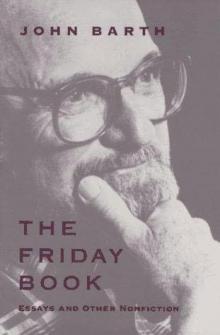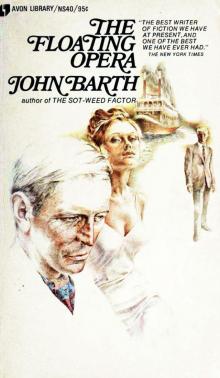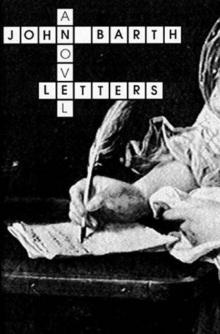- Home
- John Barth
The Floating Opera Page 7
The Floating Opera Read online
Page 7
I’ve no idea what we did. Indeed, I’ve often wondered, if there were many soldiers like me, how the Allies won the war. God knows how much the government had spent on my training, hurried as it was, and then I—all of us—simply collapsed. No cowardice, no fear (not yet); we were simply robbed of muscle by the noise.
Just before dark, I remember, I found myself belly-down on a sort of ridge. All around were splintered tree stumps, three feet high. I had no idea what I was doing there. The sun was almost down, and there was a great deal of smoke in the air. A number of uniformed figures seemed to be attending to some business of theirs in a hollow below me. The barrage, I think, had ceased, or else I was totally deaf.
“Why,” I said to myself, rather drunkenly, “those men are German soldiers. That is the enemy.”
I could scarcely believe it. For heaven’s sake! German soldiers! It occurred to me that I was supposed to kill them. I didn’t even look around to see if the rest of the United States Army was with me; I simply fired my rifle any number of times at the men working in the hollow. None of them dropped dead, or even seemed to notice their danger. It seems to me they should have counterattacked, or taken cover, or something. No, sir. I remember very carefully reloading and firing, reloading and firing, reloading and firing. It was a hell of an easy war, but how in the world did you go about killing the enemy soldiers? And where was everyone else?
The next thing that happened (for scenes changed in this battle as in dreams) happened in the dark. Suddenly it had been nighttime for a while. This time it was I who was in a hollow, on all fours in a shell hole half full of muddy water. I still had my rifle, but it was empty, and if I owned any more ammunition I didn’t remember how to put it in the rifle. I was just there, on hands and knees, my head hanging down, staring at the water. Everything was quiet again; only a few flares made a hissing noise as they drifted down through the air. And now there came real fear, quickly but not suddenly, a purely physical sensation. It swept over me in shuddering waves from my thighs and buttocks to my shoulders and jaws and back again, one shock after another, exactly as though rolls of flesh were undulating. There was no cowardice involved; in fact, my mind wasn’t engaged at all—either I was thinking of something else or, more probably, I was just stupefied. Cowardice involves choice, but fear is independent of choice. When the waves reached my hips and thighs I opened my sphincters; when they crossed my stomach and chest I retched and gasped; when they struck my face my jaw hung slack, my saliva ran, my eyes watered. Then back they’d go again, and then return. I’ve no way of knowing how long this lasted: perhaps only a minute. But it was the purest and strongest emotion I’ve ever experienced. I could actually, for a part of the time it lasted, regard myself objectively: a shocked, drooling animal in a mudhole. It is one thing to agree intellectually to the proposition that man is a species of animal; quite another to realize, thoroughly and for good, your personal animality, to the extent that you are actually never able to oppose the terms man and animal, even in casual speech; never able to regard your fellow creatures except as more or less intelligent, more or less healthy, more or less dangerous, more or less adequate fauna; never able to regard their accomplishments except as the tricks of more or less well-trained beasts. In my case this has been true since that night, and no one—not my father, nor Jane, nor myself—have I been able even for a moment to regard differently.
The other part of the incident followed immediately. Both armies returned from wherever they’d been hiding, and I was aware for the first time that a battle was really in progress. A great deal of machine-gun fire rattled across the hollow from both sides; men in ones and twos and threes stalked or crawled or ran all around, occasionally peering into my shell hole; the flares blazed more frequently, and there was much shooting, shouting, screaming, and cursing. This must have lasted for hours. With a part of my mind I was perfectly willing to join in the fighting, though I was confused; if someone had shouted orders at me, I’m certain I’d have obeyed them. But I was left entirely alone, and alone my body couldn’t move. The waves of fear were gone, but they’d left me exhausted, still in the same position.
Finally the artillery opened up again, apparently laying their fire exactly in the hollow, where the hand-to-hand fighting was in progress. Perhaps both sides had resolved to clean up that untidy squabble with high-explosive shells and begin again. Most of the explosions seemed to be within a few hundred feet of my hole, and the fear returned. There was no question in my mind but that I’d be killed; what I feared was the knowledge that my dying could very well be protracted and painful, and that it must be suffered alone. The only thing I was able to wish for was someone to keep me company while I went through with it.
Sentimental? It certainly is, and I’ve thought so ever since. But that’s what the feeling was, and it was tremendously strong, and I’d not be honest if I didn’t speak of it. It was such a strong feeling that when from nowhere a man jumped into the mudhole beside me, I fell on him instantly and embraced him as hard as I could. Very sensibly he assumed I was attacking him, and with some cry of alarm he wrenched away. I fell on him again, before he could raise his rifle, but he managed, in our tussling, to run the point of his bayonet into the calf of my left leg, not very deeply. I shouted in his ear that I didn’t want to fight with him; that I loved him; and at the same time—since I was larger and apparently stronger than he—I got behind him and pinioned his arms and legs. He struggled for a long time, and in German, so that I knew him to be an enemy soldier. How could I make everything clear to him? Even if I were able to talk to him and explain my intentions, he would certainly think me either a coward or a lunatic, and kill me anyway. He had to understand everything at once.
Of course, I could have killed him, and I’m sure he understood that fact; he was helpless. What I did, finally, was work my rifle over to me with one hand, after rolling my companion onto his stomach in the muddy water, and then put the point of my bayonet on the back of his neck, until it just barely broke the skin and drew a drop of blood. My friend went weak—collapsed, in fact—and what he cried in German I took to be either a surrender, a plea for mercy, or both. Not wanting to leave any doubts about the matter, I held him there for several minutes more, perhaps even pressing a trifle harder on the bayonet, until he broke down, lost control of all his bodily functions, as I had done earlier, and wept. He had, I believe, the same fear; certainly he was a shocked animal.
Where was the rest of the U. S. Army? Reader, I’ve never learned where the armies spent their time in this battle!
Now read this paragraph with an open mind; I can’t warn you too often not to make the quickest, easiest judgments of me, if you’re interested in being accurate. The thing I did was lay aside my rifle, bayonet and all, lie in the mud beside this animal whom I’d reduced to paralysis, and embrace him as fiercely as any man ever embraced his mistress. I covered his dirty stubbled face with kisses: his staring eyes, his shuddering neck. Incredibly, now that I look back on it, he responded in kind! The fear left him, as it had left me, and for an hour, I’m sure, we clung to each other.
If the notion of homosexuality enters your head, you’re normal, I think. If you judge either the German sergeant or myself to have been homosexual, you’re stupid.
After our embrace, the trembling of both of us subsided, and we released each other. There was a complete and, to my knowledge, unique understanding between us. I, in fact, was something like normal for the first time since stepping out of the lorry. I was aware, now, with all my senses. A great many shells were whistling overhead, but none were bursting very near us, and the hand-to-hand fighting had apparently moved elsewhere.
The German and I sat on opposite sides of the shell hole, perhaps five feet apart, smiling at each other in complete understanding. Occasionally we attempted to communicate by gestures, but for the most part communication was unnecessary. I had dry cigarettes; he had none. He had rations; I had none. Neither had ammunition. Both had bandages and iod
ine. Both had bayonets. We shared the cigarettes and rations; I bandaged the wound in his neck, and he the wound in my leg. He indicated the seat of his trousers and held his nose. I indicated the seat of my trousers and did likewise. We both laughed until we cried, and fell into each other’s arms again—though only for an instant this time: our fear had gone, and normal embarrassment had taken its place. We regarded each other warmly. Perhaps we slept.
Never in my life had I enjoyed such intense intimacy, such clear communication with a fellow human being, male or female, as I enjoyed with that German sergeant. He was a little, grizzled, unlovely fellow, considerably older than I; doubtless a professional soldier. I saw him more clearly as the day dawned. While he slept I felt as jealous and protective—I think exactly as jealous and protective—as a lion over her cub. If any American, even my father, had jumped into the shell hole at that moment, I’d have killed him unhesitatingly before he could kill my friend. What validity could the artifices of family and nation claim beside a bond like ours? I asked myself. What difference did it make that we would go our separate ways, never having learned even the other’s name, he to kill other Americans, I perhaps to kill other Germans? He and I had made a private armistice. What difference (I asked myself) did it make even if we were to meet each other again, face to face, in the numberless chances of war, and without a smile of recognition, go at each other with bayonets? For the space of some hours we had been one man, had understood each other beyond friendship, beyond love, as a wise man understands himself.
Let me end the story. My rhetorical questions, as you may have anticipated, raised after a while the germ of a doubt in my mind. To be sure, I understood perfectly how I felt about our relationship. But then, I had instigated it. My companion had indeed responded, but from beneath the pointed end of my bayonet, his face down in the mud. Again, he’d not turned on me, though he’d had many opportunities to do so since our tacit truce; but, as I remarked, he looked like an old professional soldier, and I, remember, was only eighteen. How could I be certain that our incredible sympathy did not actually exist only in my imagination, and that he was not all the while smiling to himself, taking me for a lunatic or a homosexual crank, biding his time, resting, smoking, sleeping—until he was good and ready to kill me? Only a hardened professional could sleep so soundly and contentedly in a mudhole during a battle. There was even a trace of a smile on his lips. Was it not something of a sneer?
In the growing light everything seemed less nightmarish. Doubtless the fighting had moved considerably away from our position. Was I in German territory, or was he in Allied territory? He was indeed an unlovely fellow. Common-looking, and tough. No intelligence in his face. Heaven knows he looked incapable of conceiving or appreciating any such rapport as I’d envisioned. Hadn’t he speared my leg? Of course, I’d jumped him first…
I grew increasingly nervous, and peered out of my hole. Not a living soul was visible, though a number of bodies lay in various positions and degrees of completeness on the ground, in the barbed wire, on the shattered stumps, in other holes. The air was full of smoke and dust and atmospheric haze, and it was a bit chilly. My leg hurt. I sat back in the hole and stared nervously at the German sergeant, waiting for some sign of his awakening. I even took up my rifle (and moved his away), just to be safe. I was getting jumpier all the time, and began to worry that the fear might return.
Finally I decided to sneak quietly out of the hole and make my way to the Americans, if I could find them, leaving the German asleep. A perfect solution! I rose to my feet, holding my rifle and not taking my eyes from the German soldier’s face. At once he opened his eyes, and although his head didn’t move, a look of terrible alarm flashed across his face. In an instant I lunged at him and struck him in the chest with my bayonet. The blow stunned him, and my weight on the rifle held him pinned, but the blade lodged in his breastbone and refused to enter.
My God! I thought frantically. Can’t 1 kill him? He grasped the muzzle of my rifle in both hands, trying to force it away from him, but I had better leverage from my standing position. We strained silently for a second. My eyes were on the bayonet; his, I fear, on my face. At last the point slipped up off the bone, from our combined straining—our last correspondence!—and with a tiny horrible puncturing sound, slid into and through his neck, and he began to die. I dropped the rifle—no force on earth could have made me withdraw it—and fled, trembling, across the shattered hollow. By merest luck, the first soldiers I encountered were American, and the battle was over for me.
That’s my war story. I told it—apropos of what? Oh yes, it cured me. In fact, it cured me of several things. I seldom daydream any more, even for an instant. I never expect very much from myself or my fellow animals. I almost never characterize people in a word or phrase, and rarely pass judgment on them at all. I no longer look for the esteem or approbation of my acquaintances. I do things more slowly, more systematically, and more thoroughly. To be sure, I don’t call that one incident, traumatic as it proved to be, the single cause of all these alterations in me; in fact, I don’t see where some of them follow at all. But when I think of the alterations, I immediately think of the incident (specifically, I confess, of that infinitesimal puncturing noise), and that fact seems significant to me, though I’ll allow the possibility of the whole thing’s being a case of post hoc, ergo propter hoc, as the logicians say. I don’t really care.
So, when I was mustered out of service in 1919 and entered Johns Hopkins University, I began to re-learn, correctly, a number of things that I’d half-learned before—among them the technique of thinking clearly. I found, for example, that when I handled a tennis racket correctly, I had little aptitude for tennis. On the other hand, my golf game improved considerably. I gave up playing the piano. And, when in 1935 I again took a mild interest in boats, I did everything correctly right from the beginning. Not that I believe, as many people do, that there is some intrinsic ethical yalue in doing things properly rather than improperly. I don’t subscribe, as an ethical premise, to the proposition that anything worth doing is worth doing well. It’s simply that I’ve been incapable, temperamentally, of doing things otherwise than correctly since 1918, just as prior to then I was very nearly incapable of doing anything just right.
My boat is a thirty-five-foot work boat, “torpedo-backed” and narrow-beamed in the manner of the tong boats used hereabouts. Her frames, keel, and floor timbers are of stout white oak, and her side, deck, and bottom planking of good white cedar. A very seaworthy little craft, carefully, slowly, and correctly built. By this morning in 1937 I’d been working on her for two years, doing perhaps an hour’s work each day. Many mornings I remember, I simply sat in the garage and stared at her, thinking out the wisest next move, or at the wall, thinking of nothing.
On this particular morning I laid some floor planking: I’d finished planking the sides and bottom and had turned the hull right side up. As usual, I didn’t bother to change my clothes or even roll my sleeves; in hat, coat, and tie I set to work laying ¾” X 3” tongue-and-groove cedar planks to the floor beams, fastening them with bronze screws and galvanized wire nails, countersunk and puttied over. I’d cut the planks the day before, so that at the end of my hour most of the deck was laid and I wasn’t even sweating. I brushed the knees of my trousers (they weren’t dirty, for I kept my wood clean), lit my second cigar of the day, surveyed my work for several minutes, and then left for the office, closing the garage door behind me. If anyone ever took the trouble to finish my boat, I reflected without sorrow, he’d have himself an excellent vessel.
VIII. a note, a warning
A note, a warning, if I may?
I got from my father the habit of doing manual work in my good clothes. Dad always made a fetish of it, like the nineteenth-century surgeons who affected evening clothes in the operating rooms and prided themselves on executing difficult surgery without bloodying their starched and studded shirt fronts.
“It teaches a man to be careful,” D
ad declared, “and to work easily. Hard work isn’t always good work.” In the same attire he’d worn that afternoon in court, boutonniere and all, Dad would spade the vegetable garden before supper, spray the catalpa trees for caterpillars (mixing the unslaked-lime spray himself), and perhaps whitewash the foundation piers of the house or hose off the car. He never got dirty or wet, or even ruffled. When one day in 1930 I came home from the office and found Dad in the cellar, one end of his belt spiked to the floor joist and the other fastened around his neck, there was not a smudge of dirt anywhere on him, though the cellar was quite dusty. His clothes were perfectly creased and free of wrinkles, and although his face was black and his eyes were popped, his hair was neatly and correctly combed.
I agree with Dad that doing manual labor in one’s office clothes teaches one to work carefully and neatly, and I follow his practice almost consistently. But I suspect that he attributed to the habit some terminal value; it was, I think, related to some vague philosophy of his. With me that is not the case, and I caution you against inferring anything of a philosophical flavor from my practice. There is in my daily routine a great deal that legitimately implies my ideas about things, but you mustn’t work from the wrong things or you’ll go astray. Perhaps I shouldn’t even have mentioned working on my boat in my good clothes.

 Final Fridays
Final Fridays Where Three Roads Meet: Novellas
Where Three Roads Meet: Novellas Every Third Thought: A Novel in Five Seasons
Every Third Thought: A Novel in Five Seasons The Sot-Weed Factor
The Sot-Weed Factor The Friday Book
The Friday Book Giles Goat Boy
Giles Goat Boy The Tidewater Tales
The Tidewater Tales The Development
The Development The Floating Opera
The Floating Opera Letters
Letters Chimera
Chimera Where Three Roads Meet
Where Three Roads Meet Every Third Thought
Every Third Thought